The Cambridge History of China. Vol. 12: Republican China, 1912-1949, Part 1
Подождите немного. Документ загружается.

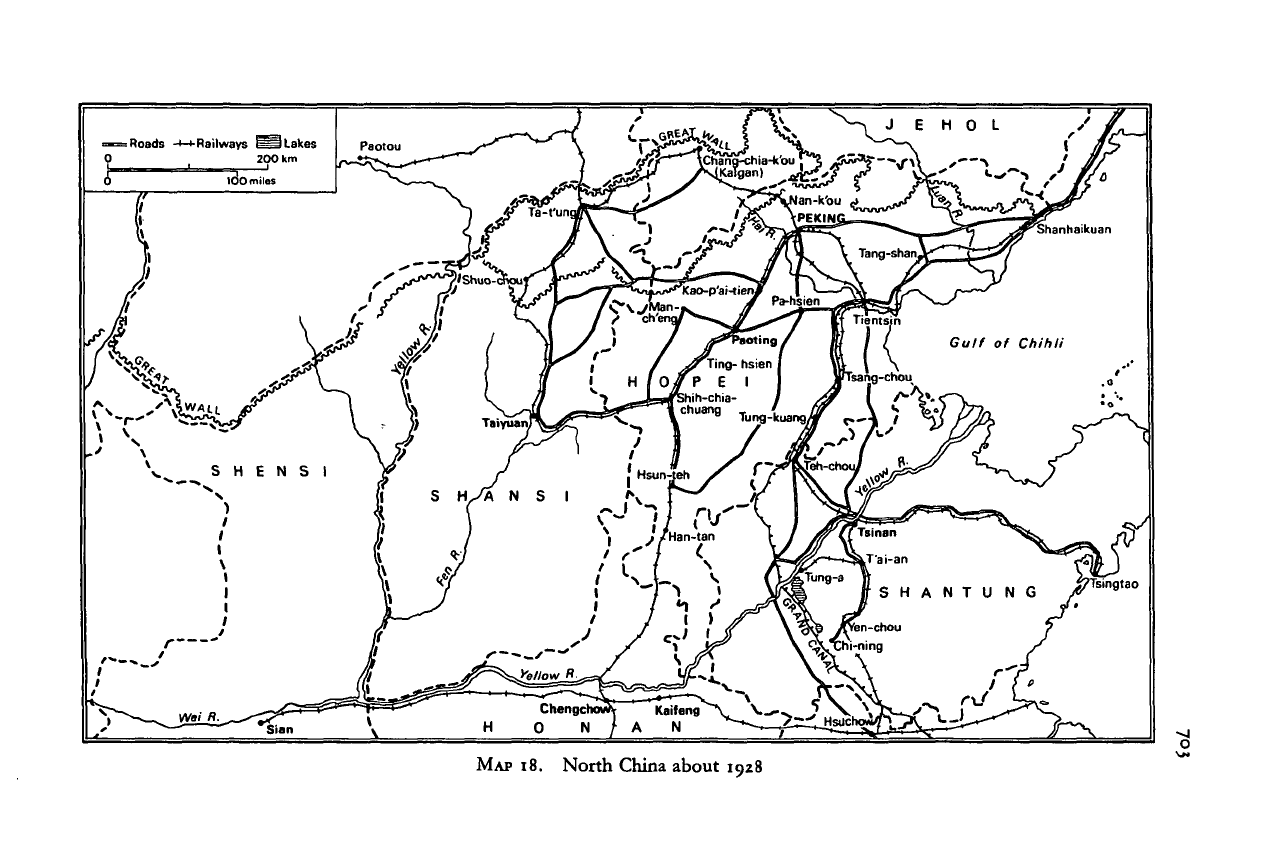
= Roods
MAP
I8. North China about
Cambridge Histories Online © Cambridge University Press, 2008
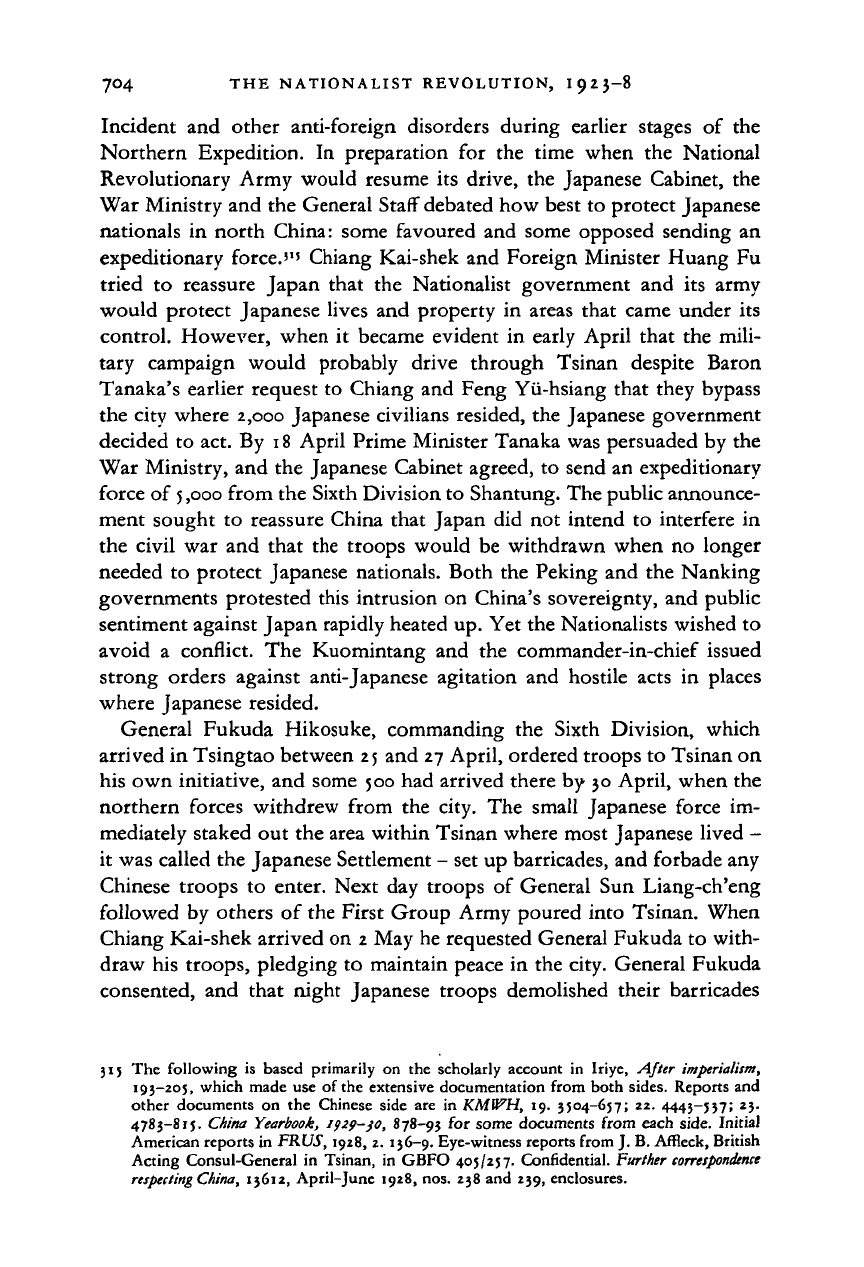
704 THE NATIONALIST REVOLUTION, I 923-8
Incident and other anti-foreign disorders during earlier stages of the
Northern Expedition. In preparation for the time when the National
Revolutionary Army would resume its drive, the Japanese Cabinet, the
War Ministry and the General Staff debated how best to protect Japanese
nationals in north China: some favoured and some opposed sending an
expeditionary force.'
1
' Chiang Kai-shek and Foreign Minister Huang Fu
tried to reassure Japan that the Nationalist government and its army
would protect Japanese lives and property in areas that came under its
control. However, when it became evident in early April that the mili-
tary campaign would probably drive through Tsinan despite Baron
Tanaka's earlier request to Chiang and Feng Yii-hsiang that they bypass
the city where 2,000 Japanese civilians resided, the Japanese government
decided to act. By 18 April Prime Minister Tanaka was persuaded by the
War Ministry, and the Japanese Cabinet agreed, to send an expeditionary
force of
5,000
from the Sixth Division to Shantung. The public announce-
ment sought to reassure China that Japan did not intend to interfere in
the civil war and that the troops would be withdrawn when no longer
needed to protect Japanese nationals. Both the Peking and the Nanking
governments protested this intrusion on China's sovereignty, and public
sentiment against Japan rapidly heated up. Yet the Nationalists wished to
avoid a conflict. The Kuomintang and the commander-in-chief issued
strong orders against anti-Japanese agitation and hostile acts in places
where Japanese resided.
General Fukuda Hikosuke, commanding the Sixth Division, which
arrived in Tsingtao between 25 and 27 April, ordered troops to Tsinan on
his own initiative, and some 500 had arrived there by 30 April, when the
northern forces withdrew from the city. The small Japanese force im-
mediately staked out the area within Tsinan where most Japanese lived -
it was called the Japanese Settlement - set up barricades, and forbade any
Chinese troops to enter. Next day troops of General Sun Liang-ch'eng
followed by others of the First Group Army poured into Tsinan. When
Chiang Kai-shek arrived on 2 May he requested General Fukuda to with-
draw his troops, pledging to maintain peace in the city. General Fukuda
consented, and that night Japanese troops demolished their barricades
315 The following is based primarily on the scholarly account in Iriye, After imperialism,
193-205, which made use of the extensive documentation from both sides. Reports and
other documents on the Chinese side are in KMfPH, 19. 3504-657; 22. 4443-537; 23.
4783-815. China Yearbook,
1929—)0,
878-93 for some documents from each side. Initial
American reports in FRUS, 1928, 2. 136-9. Eye-witness reports from J. B. Affleck, British
Acting Consul-General in Tsinan, in GBFO 405/257. Confidential. Further
correspondence
respecting
China,
13612, April-June 1928, nos. 238 and 239, enclosures.
Cambridge Histories Online © Cambridge University Press, 2008
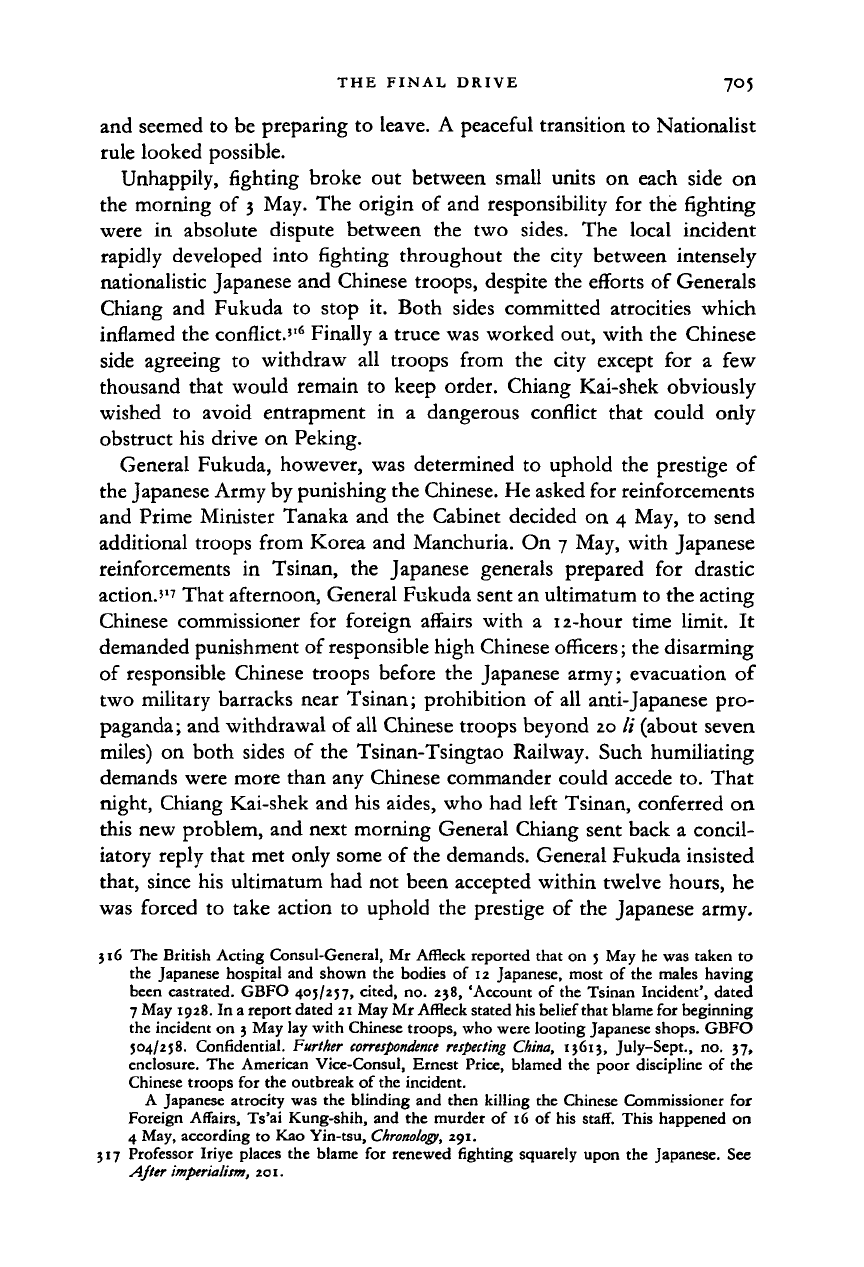
THE FINAL DRIVE 705
and seemed to be preparing to leave. A peaceful transition to Nationalist
rule looked possible.
Unhappily, fighting broke out between small units on each side on
the morning of
3
May. The origin of and responsibility for the fighting
were in absolute dispute between the two sides. The local incident
rapidly developed into fighting throughout the city between intensely
nationalistic Japanese and Chinese troops, despite the efforts of Generals
Chiang and Fukuda to stop it. Both sides committed atrocities which
inflamed the conflict.'"
6
Finally a truce was worked out, with the Chinese
side agreeing to withdraw all troops from the city except for a few
thousand that would remain to keep order. Chiang Kai-shek obviously
wished to avoid entrapment in a dangerous conflict that could only
obstruct his drive on Peking.
General Fukuda, however, was determined to uphold the prestige of
the Japanese Army by punishing the Chinese. He asked for reinforcements
and Prime Minister Tanaka and the Cabinet decided on 4 May, to send
additional troops from Korea and Manchuria. On 7 May, with Japanese
reinforcements in Tsinan, the Japanese generals prepared for drastic
action.'
17
That afternoon, General Fukuda sent an ultimatum to the acting
Chinese commissioner for foreign affairs with a 12-hour time limit. It
demanded punishment of responsible high Chinese officers; the disarming
of responsible Chinese troops before the Japanese army; evacuation of
two military barracks near Tsinan; prohibition of all anti-Japanese pro-
paganda ; and withdrawal of all Chinese troops beyond 20 // (about seven
miles) on both sides of the Tsinan-Tsingtao Railway. Such humiliating
demands were more than any Chinese commander could accede to. That
night, Chiang Kai-shek and his aides, who had left Tsinan, conferred on
this new problem, and next morning General Chiang sent back a concil-
iatory reply that met only some of the demands. General Fukuda insisted
that, since his ultimatum had not been accepted within twelve hours, he
was forced to take action to uphold the prestige of the Japanese army.
516 The British Acting Consul-General, Mr Affleck reported that on 5 May he was taken to
the Japanese hospital and shown the bodies of 12 Japanese, most of the males having
been castrated. GBFO 405/257, cited, no. 238, 'Account of the Tsinan Incident', dated
7 May 1928. In a report dated 21 May Mr Affleck stated his belief that blame for beginning
the incident on 3 May lay with Chinese troops, who were looting Japanese shops. GBFO
504/258. Confidential. Further
correspondence respecting
China, 13613, July-Sept., no. 37,
enclosure. The American Vice-Consul, Ernest Price, blamed the poor discipline of the
Chinese troops for the outbreak of the incident.
A Japanese atrocity was the blinding and then killing the Chinese Commissioner for
Foreign Affairs, Ts'ai Kung-shih, and the murder of 16 of his
staff.
This happened on
4 May, according to Kao Yin-tsu,
Chronology,
291.
317 Professor Iriye places the blame for renewed fighting squarely upon the Japanese. See
After
imperialism,
201.
Cambridge Histories Online © Cambridge University Press, 2008
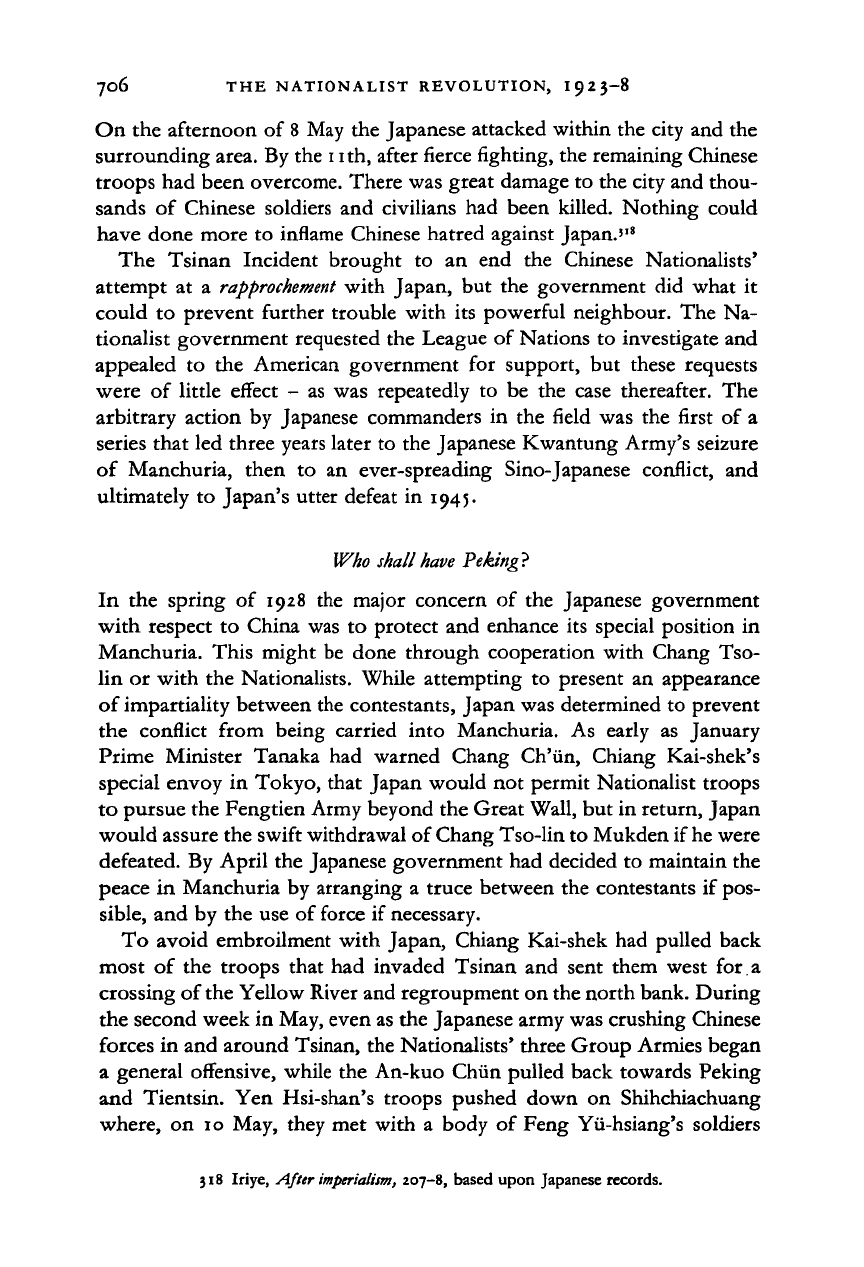
706 THE NATIONALIST REVOLUTION, I923-8
On the afternoon
of
8
May the Japanese attacked within the city and the
surrounding area. By the i ith, after fierce fighting, the remaining Chinese
troops had been overcome. There was great damage to the city and thou-
sands
of
Chinese soldiers and civilians had been killed. Nothing could
have done more to inflame Chinese hatred against Japan.'
18
The Tsinan Incident brought
to an end the
Chinese Nationalists'
attempt
at a
rapprochement
with Japan, but the government did what
it
could
to
prevent further trouble with
its
powerful neighbour. The Na-
tionalist government requested the League
of
Nations to investigate and
appealed
to the
American government
for
support,
but
these requests
were
of
little effect
- as
was repeatedly
to be the
case thereafter.
The
arbitrary action
by
Japanese commanders
in
the field was the first
of a
series that led three years later to the Japanese Kwantung Army's seizure
of Manchuria, then
to an
ever-spreading Sino-Japanese conflict,
and
ultimately
to
Japan's utter defeat
in
1945.
Who shall
have
Peking?
In
the
spring
of
1928
the
major concern
of
the Japanese government
with respect
to
China was
to
protect and enhance its special position
in
Manchuria. This might be done through cooperation with Chang Tso-
lin
or
with the Nationalists. While attempting
to
present
an
appearance
of impartiality between the contestants, Japan was determined to prevent
the conflict from being carried into Manchuria.
As
early
as
January
Prime Minister Tanaka had warned Chang Ch'iin, Chiang Kai-shek's
special envoy
in
Tokyo, that Japan would not permit Nationalist troops
to pursue the Fengtien Army beyond the Great Wall, but in return, Japan
would assure the swift withdrawal of Chang Tso-lin to Mukden if
he
were
defeated. By April the Japanese government had decided to maintain the
peace
in
Manchuria by arranging
a
truce between the contestants
if
pos-
sible,
and by the use of force if necessary.
To avoid embroilment with Japan, Chiang Kai-shek had pulled back
most
of
the troops that had invaded Tsinan and sent them west
for a
crossing of the Yellow River and regroupment on the north bank. During
the second week in May, even as the Japanese army was crushing Chinese
forces in and around Tsinan, the Nationalists' three Group Armies began
a general offensive, while the An-kuo Chun pulled back towards Peking
and Tientsin. Yen Hsi-shan's troops pushed down
on
Shihchiachuang
where,
on
10 May, they met with
a
body
of
Feng Yii-hsiang's soldiers
JI8
Iriye, After
imperialism,
207-8, based upon Japanese records.
Cambridge Histories Online © Cambridge University Press, 2008
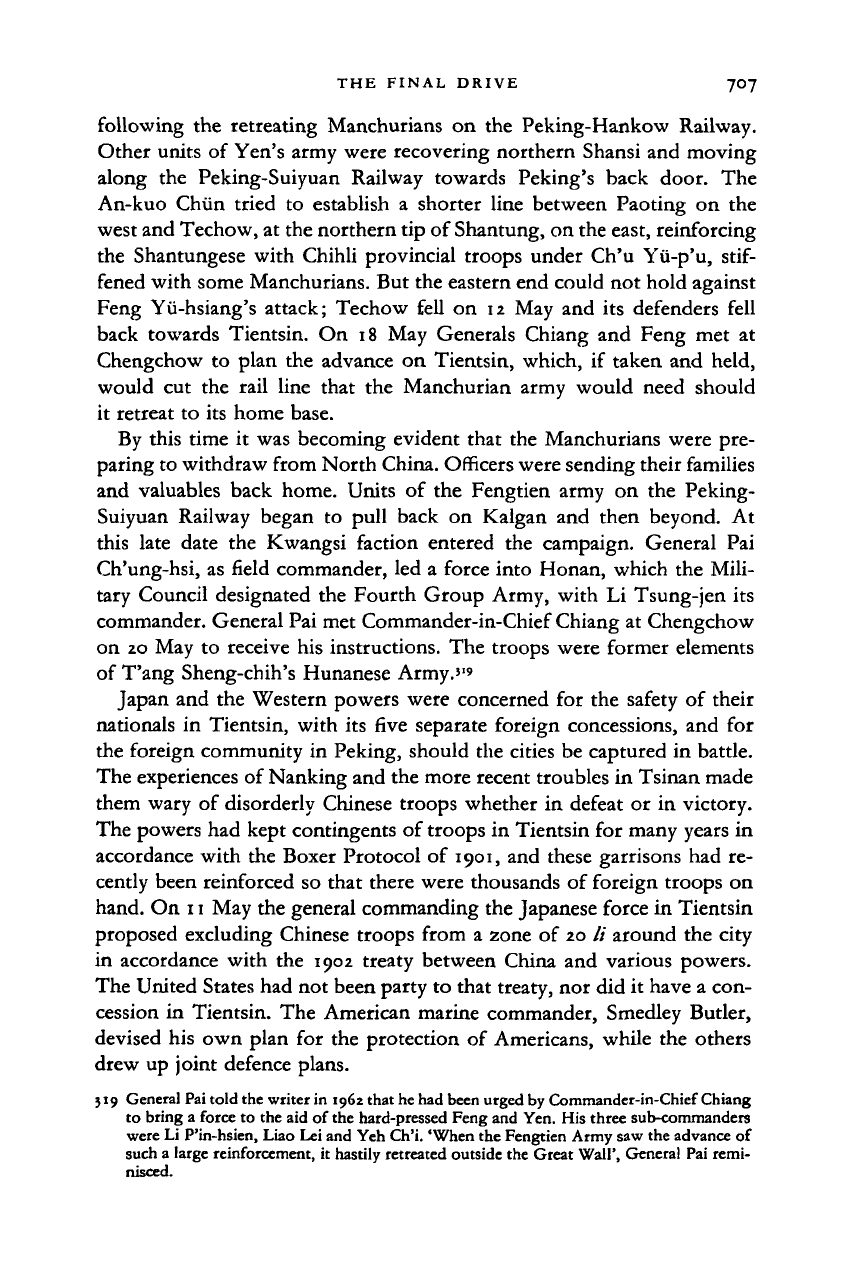
THE FINAL DRIVE 707
following the retreating Manchurians on the Peking-Hankow Railway.
Other units of Yen's army were recovering northern Shansi and moving
along the Peking-Suiyuan Railway towards Peking's back door. The
An-kuo Chun tried to establish a shorter line between Paoting on the
west and Techow, at the northern tip of Shantung, on the east, reinforcing
the Shantungese with Chihli provincial troops under Ch'u Yii-p'u,
stif-
fened with some Manchurians. But the eastern end could not hold against
Feng Yii-hsiang's attack; Techow fell on 12 May and its defenders fell
back towards Tientsin. On 18 May Generals Chiang and Feng met at
Chengchow to plan the advance on Tientsin, which, if taken and held,
would cut the rail line that the Manchurian army would need should
it retreat to its home base.
By this time it was becoming evident that the Manchurians were pre-
paring to withdraw from North China. Officers were sending their families
and valuables back home. Units of the Fengtien army on the Peking-
Suiyuan Railway began to pull back on Kalgan and then beyond. At
this late date the Kwangsi faction entered the campaign. General Pai
Ch'ung-hsi, as field commander, led a force into Honan, which the Mili-
tary Council designated the Fourth Group Army, with Li Tsung-jen its
commander. General Pai met Commander-in-Chief Chiang at Chengchow
on 20 May to receive his instructions. The troops were former elements
of T'ang Sheng-chih's Hunanese Army.
5
'
9
Japan and the Western powers were concerned for the safety of their
nationals in Tientsin, with its five separate foreign concessions, and for
the foreign community in Peking, should the cities be captured in battle.
The experiences of Nanking and the more recent troubles in Tsinan made
them wary of disorderly Chinese troops whether in defeat or in victory.
The powers had kept contingents of troops in Tientsin for many years in
accordance with the Boxer Protocol of 1901, and these garrisons had re-
cently been reinforced so that there were thousands of foreign troops on
hand. On 11 May the general commanding the Japanese force in Tientsin
proposed excluding Chinese troops from a zone of 20 // around the city
in accordance with the 1902 treaty between China and various powers.
The United States had not been party to that treaty, nor did it have a con-
cession in Tientsin. The American marine commander, Smedley Butler,
devised his own plan for the protection of Americans, while the others
drew up joint defence plans.
519 General Pai told the writer in 1962 that he had been urged by Commander-in-Chief Chiang
to bring a force to the aid of the hard-pressed Feng and Yen. His three sub-commanders
were Li P'in-hsien, Liao Lei and Yeh Ch'i. 'When the Fengtien Army saw the advance of
such a large reinforcement, it hastily retreated outside the Great Wall', General Pai remi-
nisced.
Cambridge Histories Online © Cambridge University Press, 2008
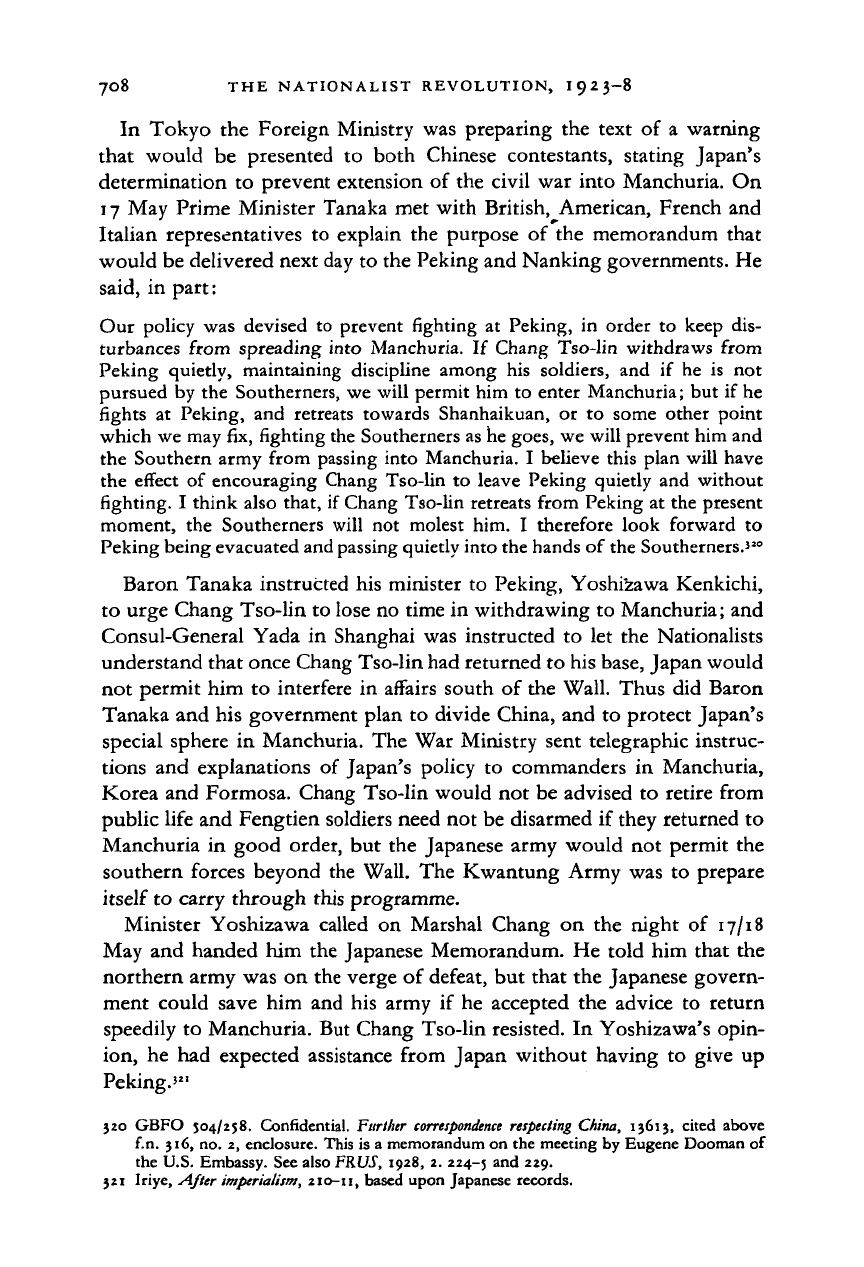
708 THE NATIONALIST REVOLUTION, I 9 2 3-8
In Tokyo the Foreign Ministry was preparing the text of a warning
that would be presented to both Chinese contestants, stating Japan's
determination to prevent extension of the civil war into Manchuria. On
17 May Prime Minister Tanaka met with British, American, French and
Italian representatives to explain the purpose of the memorandum that
would be delivered next day to the Peking and Nanking governments. He
said, in part:
Our policy was devised to prevent fighting at Peking, in order to keep dis-
turbances from spreading into Manchuria. If Chang Tso-lin withdraws from
Peking quietly, maintaining discipline among his soldiers, and if he is not
pursued by the Southerners, we will permit him to enter Manchuria; but if he
fights at Peking, and retreats towards Shanhaikuan, or to some other point
which we may fix, fighting the Southerners as he goes, we will prevent him and
the Southern army from passing into Manchuria. I believe this plan will have
the effect of encouraging Chang Tso-lin to leave Peking quietly and without
fighting. I think also that, if Chang Tso-lin retreats from Peking at the present
moment, the Southerners will not molest him. I therefore look forward to
Peking being evacuated and passing quietly into the hands of the Southerners.
520
Baron Tanaka instructed his minister to Peking, Yoshizawa Kenkichi,
to urge Chang Tso-lin to lose no time in withdrawing to Manchuria; and
Consul-General Yada in Shanghai was instructed to let the Nationalists
understand that once Chang Tso-lin had returned to his base, Japan would
not permit him to interfere in affairs south of the Wall. Thus did Baron
Tanaka and his government plan to divide China, and to protect Japan's
special sphere in Manchuria. The War Ministry sent telegraphic instruc-
tions and explanations of Japan's policy to commanders in Manchuria,
Korea and Formosa. Chang Tso-lin would not be advised to retire from
public life and Fengtien soldiers need not be disarmed if they returned to
Manchuria in good order, but the Japanese army would not permit the
southern forces beyond the Wall. The Kwantung Army was to prepare
itself to carry through this programme.
Minister Yoshizawa called on Marshal Chang on the night of 17/18
May and handed him the Japanese Memorandum. He told him that the
northern army was on the verge of defeat, but that the Japanese govern-
ment could save him and his army if he accepted the advice to return
speedily to Manchuria. But Chang Tso-lin resisted. In Yoshizawa's opin-
ion, he had expected assistance from Japan without having to give up
Peking.'
21
320 GBFO 504/258. Confidential. Further
correspondence respecting
China, 13613, cited above
f.n. 316, no. 2, enclosure. This is a memorandum on the meeting by Eugene Dooman of
the U.S. Embassy. See also FRUS, 1928, 2. 224-5
an
d
22
9-
321 Iriye, After imperialism, 210-n, based upon Japanese records.
Cambridge Histories Online © Cambridge University Press, 2008
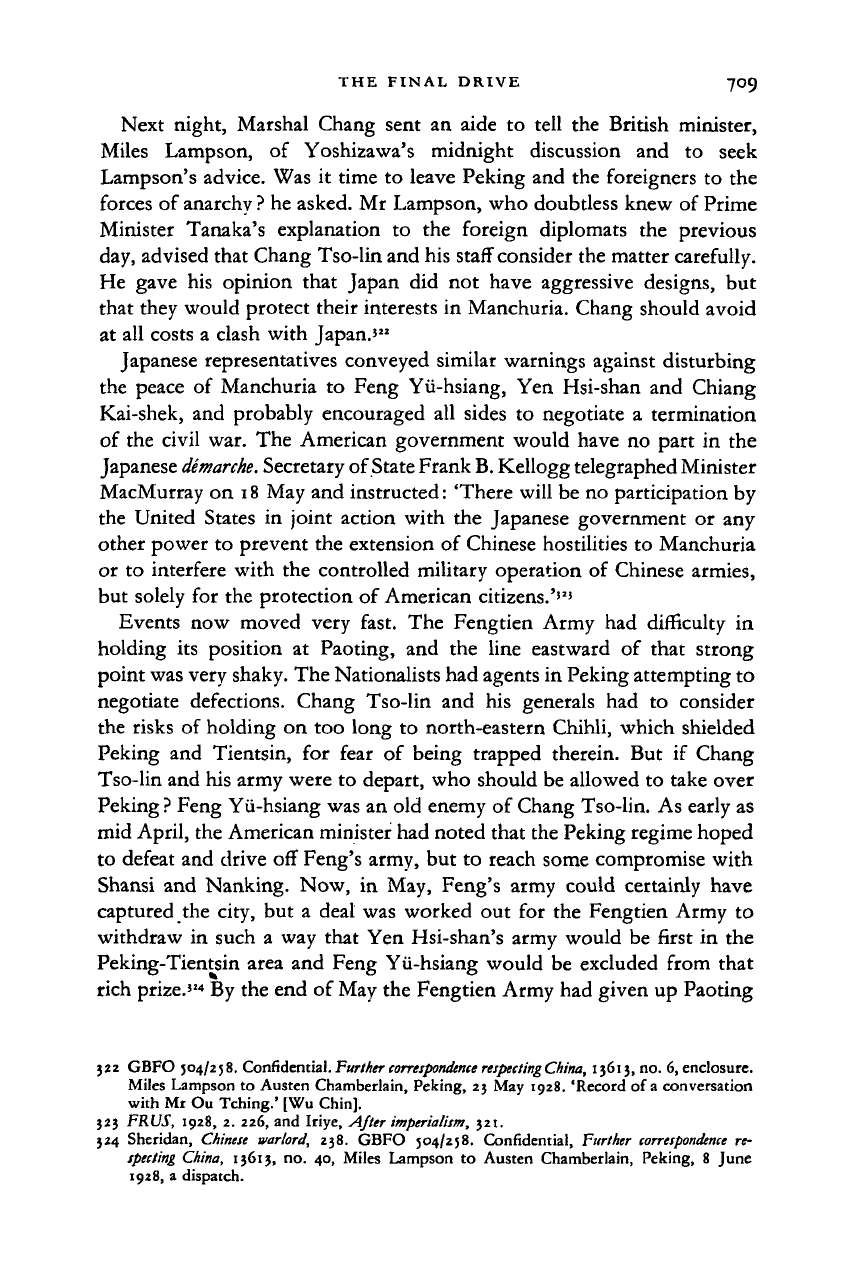
THE FINAL DRIVE 709
Next night, Marshal Chang sent
an
aide
to
tell
the
British minister,
Miles Lampson,
of
Yoshizawa's midnight discussion
and to
seek
Lampson's advice. Was
it
time
to
leave Peking and the foreigners
to
the
forces of anarchy
?
he asked. Mr Lampson, who doubtless knew of Prime
Minister Tanaka's explanation
to the
foreign diplomats
the
previous
day, advised that Chang Tso-lin and his staff consider the matter carefully.
He gave
his
opinion that Japan
did not
have aggressive designs,
but
that they would protect their interests in Manchuria. Chang should avoid
at all costs
a
clash with Japan.'"
Japanese representatives conveyed similar warnings against disturbing
the peace
of
Manchuria
to
Feng Yii-hsiang, Yen Hsi-shan and Chiang
Kai-shek, and probably encouraged
all
sides
to
negotiate
a
termination
of the civil war. The American government would have
no
part
in
the
Japanese
demarche.
Secretary of State Frank
B.
Kellogg telegraphed Minister
MacMurray on 18 May and instructed: 'There will be no participation by
the United States
in
joint action with
the
Japanese government
or
any
other power to prevent the extension
of
Chinese hostilities
to
Manchuria
or
to
interfere with the controlled military operation
of
Chinese armies,
but solely
for
the protection of American citizens.''
2
'
Events now moved very fast. The Fengtien Army
had
difficulty
in
holding
its
position
at
Paoting,
and the
line eastward
of
that strong
point was very shaky. The Nationalists had agents in Peking attempting to
negotiate defections. Chang Tso-lin
and his
generals
had to
consider
the risks of holding on too long
to
north-eastern Chihli, which shielded
Peking
and
Tientsin,
for
fear
of
being trapped therein.
But if
Chang
Tso-lin and his army were to depart, who should be allowed to take over
Peking
?
Feng Yii-hsiang was an old enemy of Chang Tso-lin. As early as
mid April, the American minister had noted that the Peking regime hoped
to defeat and drive off Feng's army, but to reach some compromise with
Shansi and Nanking. Now,
in
May, Feng's army could certainly have
captured the city, but
a
deal was worked out
for
the Fengtien Army
to
withdraw
in
such
a
way that Yen Hsi-shan's army would be first
in
the
Peking-Tientsin area and Feng Yii-hsiang would
be
excluded from that
rich prize.'
24
By the end of May the Fengtien Army had given up Paoting
322 GBFO 504/25
8.
Confidential.
Further correspondence respecting
China,
13613, no. 6, enclosure.
Miles Lampson
to
Austen Chamberlain, Peking, 23 May 1928. 'Record of a conversation
with Mr Ou Tching.' [Wu
Chin].
323 FRUS, 1928,
2.
226, and Iriye, After
imperialism,
321.
324
Sheridan,
Chinese
warlord,
238.
GBFO
504/258.
Confidential,
Further correspondence
re-
specting
China, 13615,
no. 40,
Miles Lampson
to
Austen Chamberlain, Peking,
8
June
1928,
a
dispatch.
Cambridge Histories Online © Cambridge University Press, 2008
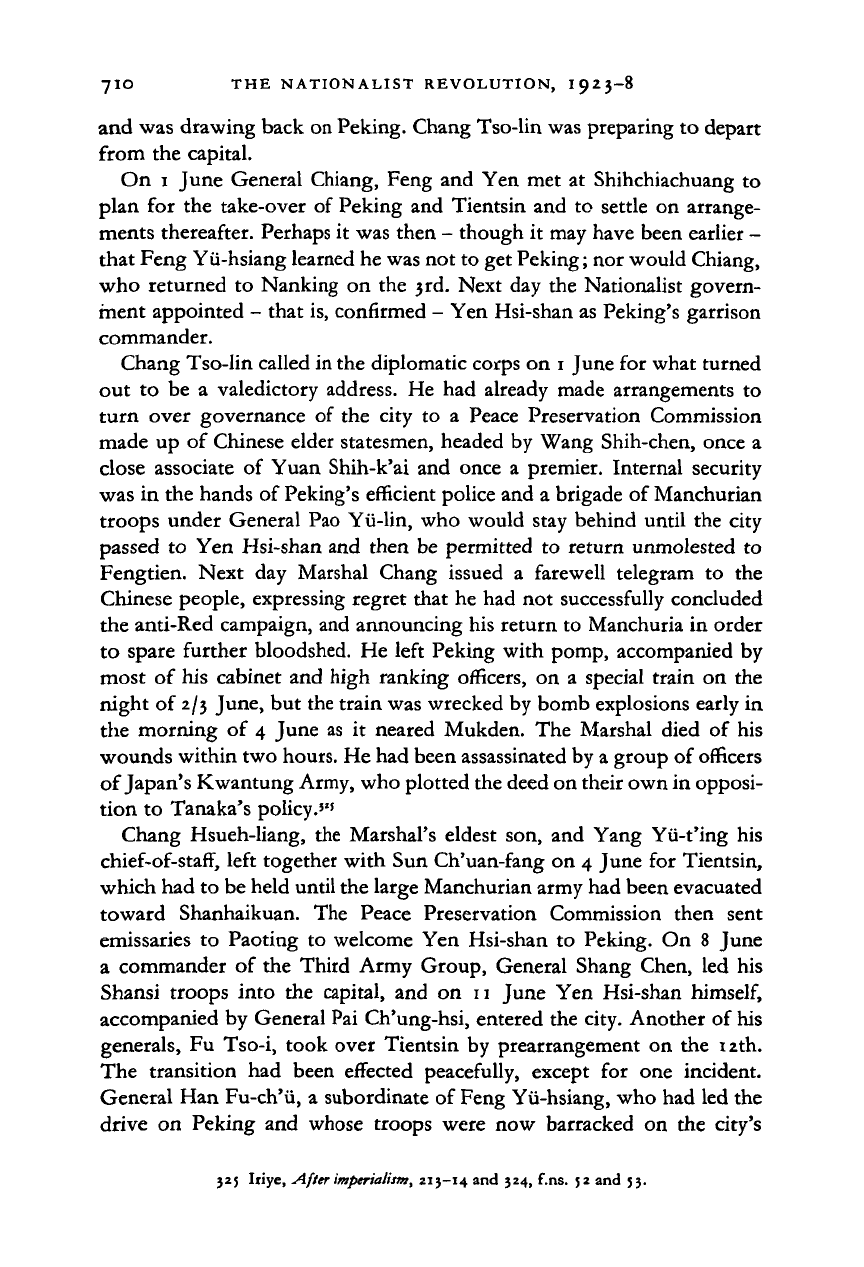
7IO THE NATIONALIST REVOLUTION, 1923-8
and was drawing back on Peking. Chang Tso-lin was preparing to depart
from the capital.
On 1 June General Chiang, Feng and Yen met at Shihchiachuang to
plan for the take-over of Peking and Tientsin and to settle on arrange-
ments thereafter. Perhaps it was then - though it may have been earlier -
that Feng Yii-hsiang learned he was not to get Peking; nor would Chiang,
who returned to Nanking on the 3rd. Next day the Nationalist govern-
ment appointed - that is, confirmed - Yen Hsi-shan as Peking's garrison
commander.
Chang Tso-lin called in the diplomatic corps on
1
June for what turned
out to be a valedictory address. He had already made arrangements to
turn over governance of the city to a Peace Preservation Commission
made up of Chinese elder statesmen, headed by Wang Shih-chen, once a
close associate of Yuan Shih-k'ai and once a premier. Internal security
was in the hands of Peking's efficient police and a brigade of Manchurian
troops under General Pao Yii-lin, who would stay behind until the city
passed to Yen Hsi-shan and then be permitted to return unmolested to
Fengtien. Next day Marshal Chang issued a farewell telegram to the
Chinese people, expressing regret that he had not successfully concluded
the anti-Red campaign, and announcing his return to Manchuria in order
to spare further bloodshed. He left Peking with pomp, accompanied by
most of his cabinet and high ranking officers, on a special train on the
night of 2/3 June, but the train was wrecked by bomb explosions early in
the morning of 4 June as it neared Mukden. The Marshal died of his
wounds within two hours. He had been assassinated by a group of officers
of Japan's Kwantung Army, who plotted the deed on their own in opposi-
tion to Tanaka's policy.
5
'
1
Chang Hsueh-liang, the Marshal's eldest son, and Yang Yu-t'ing his
chief-of-staff, left together with Sun Ch'uan-fang on 4 June for Tientsin,
which had to be held until the large Manchurian army had been evacuated
toward Shanhaikuan. The Peace Preservation Commission then sent
emissaries to Paoting to welcome Yen Hsi-shan to Peking. On 8 June
a commander of the Third Army Group, General Shang Chen, led his
Shansi troops into the capital, and on 11 June Yen Hsi-shan
himself,
accompanied by General Pai Ch'ung-hsi, entered the city. Another of his
generals, Fu Tso-i, took over Tientsin by prearrangement on the 12th.
The transition had been effected peacefully, except for one incident.
General Han Fu-ch'ii, a subordinate of Feng Yii-hsiang, who had led the
drive on Peking and whose troops were now barracked on the city's
525 Iriye, After
imperialism,
213-14 and 324, f.ns. 52 and 53.
Cambridge Histories Online © Cambridge University Press, 2008
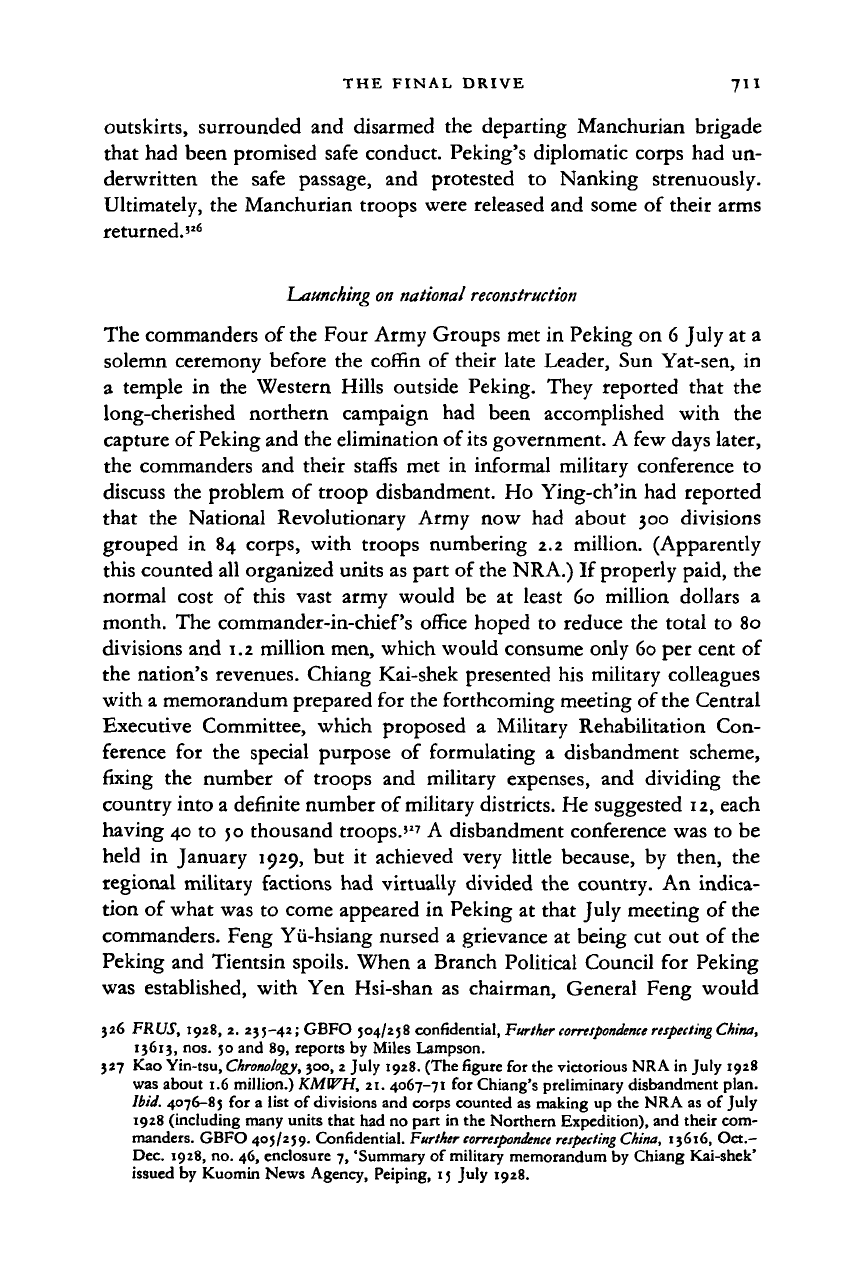
THE FINAL DRIVE 7II
outskirts, surrounded and disarmed the departing Manchurian brigade
that had been promised safe conduct. Peking's diplomatic corps had un-
derwritten
the
safe passage,
and
protested
to
Nanking strenuously.
Ultimately, the Manchurian troops were released and some of their arms
returned.'
26
Launching on national reconstruction
The commanders of the Four Army Groups met in Peking on 6 July at
a
solemn ceremony before the coffin
of
their late Leader, Sun Yat-sen,
in
a temple
in the
Western Hills outside Peking. They reported that
the
long-cherished northern campaign
had
been accomplished with
the
capture of Peking and the elimination of its government. A few days later,
the commanders and their staffs met
in
informal military conference
to
discuss the problem
of
troop disbandment. Ho Ying-ch'in had reported
that
the
National Revolutionary Army now
had
about
300
divisions
grouped
in 84
corps, with troops numbering
2.2
million. (Apparently
this counted all organized units as part of the NRA.) If properly paid, the
normal cost
of
this vast army would
be at
least
60
million dollars
a
month. The commander-in-chief's office hoped
to
reduce the total
to 80
divisions and 1.2 million men, which would consume only 60 per cent of
the nation's revenues. Chiang Kai-shek presented his military colleagues
with a memorandum prepared for the forthcoming meeting of the Central
Executive Committee, which proposed
a
Military Rehabilitation Con-
ference
for the
special purpose
of
formulating
a
disbandment scheme,
fixing the number
of
troops
and
military expenses,
and
dividing
the
country into a definite number of military districts. He suggested 12, each
having 40 to 50 thousand troops.'
27
A disbandment conference was to be
held
in
January 1929,
but it
achieved very little because,
by
then,
the
regional military factions had virtually divided the country. An indica-
tion of what was to come appeared in Peking at that July meeting of the
commanders. Feng Yii-hsiang nursed
a
grievance at being cut out of the
Peking and Tientsin spoils. When
a
Branch Political Council
for
Peking
was established, with Yen Hsi-shan
as
chairman, General Feng would
326 FRUS, 1928, 2. 235-42; GBFO 504/258 confidential,
Further correspondence respecting
China,
13613,
nos. 50 and 89, reports by Miles Lampson.
347 Kao Yin-tsu,
Chronology,
300, 2 July 1928. (The figure for the victorious NRA in July 1928
was about 1.6 million.)
KMWH,
21. 4067-71 for Chiang's preliminary disbandment plan.
Ibid.
4076-85 for
a
list of divisions and corps counted as making up the NRA as
of
July
1928 (including many units that had no part in the Northern Expedition), and their com-
manders. GBFO 405/259. Confidential.
Further correspondence respecting
China,
13616, Oct.-
Dec. 1928, no. 46, enclosure
7,
'Summary
of
military memorandum by Chiang Kai-shek'
issued by Kuomin News Agency, Peiping, 15 July 1928.
Cambridge Histories Online © Cambridge University Press, 2008
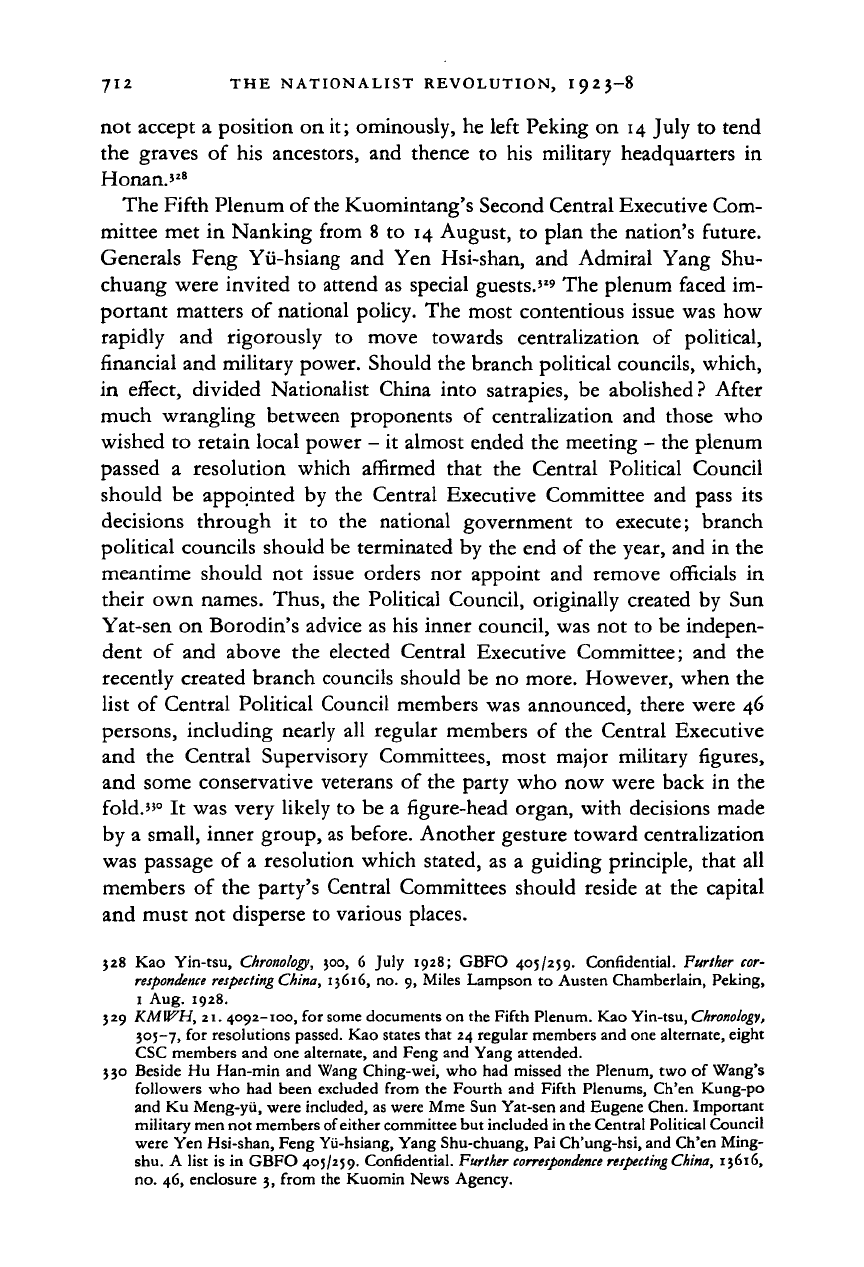
712 THE NATIONALIST REVOLUTION, I 9
2
3-8
not accept
a
position
on it;
ominously,
he
left Peking
on
14 July
to
tend
the graves
of
his
ancestors,
and
thence
to his
military headquarters
in
Honan.'
28
The Fifth Plenum
of
the
Kuomintang's Second Central Executive Com-
mittee
met in
Nanking from
8
to
14
August,
to
plan
the
nation's future.
Generals Feng Yii-hsiang
and Yen
Hsi-shan,
and
Admiral Yang
Shu-
chuang were invited
to
attend
as
special guests.'
29
The
plenum faced
im-
portant matters
of
national policy.
The
most contentious issue
was how
rapidly
and
rigorously
to
move towards centralization
of
political,
financial and military power. Should
the
branch political councils, which,
in effect, divided Nationalist China into satrapies,
be
abolished? After
much wrangling between proponents
of
centralization
and
those
who
wished
to
retain local power
- it
almost ended
the
meeting
-
the
plenum
passed
a
resolution which affirmed that
the
Central Political Council
should
be
appointed
by the
Central Executive Committee
and
pass
its
decisions through
it to the
national government
to
execute; branch
political councils should
be
terminated
by the end of the
year,
and in the
meantime should
not
issue orders
nor
appoint
and
remove officials
in
their
own
names. Thus,
the
Political Council, originally created
by
Sun
Yat-sen
on
Borodin's advice
as his
inner council,
was not to be
indepen-
dent
of
and
above
the
elected Central Executive Committee;
and the
recently created branch councils should
be no
more. However, when
the
list
of
Central Political Council members
was
announced, there were
46
persons, including nearly
all
regular members
of
the
Central Executive
and
the
Central Supervisory Committees, most major military figures,
and some conservative veterans
of
the
party
who now
were back
in
the
fold."
0
It
was
very likely
to be
a
figure-head organ, with decisions made
by
a
small, inner group,
as
before. Another gesture toward centralization
was passage
of
a
resolution which stated,
as
a
guiding principle, that
all
members
of
the
party's Central Committees should reside
at
the
capital
and must
not
disperse
to
various places.
528
Kao
Yin-tsu,
Chronology,
joo, 6
July 1928; GBFO 405/259. Confidential. Further cor-
respondence respecting
China,
13616, no.
9,
Miles Lampson
to
Austen Chamberlain, Peking,
1 Aug. 1928.
329
KMWH,
21.
4092-100,
for
some documents on the Fifth Plenum. Kao Yin-tsu,
Chronology,
305-7,
for
resolutions passed. Kao states that 24 regular members and one alternate, eight
CSC members and one alternate, and Feng and Yang attended.
330 Beside
Hu
Han-min and Wang Ching-wei, who had missed
the
Plenum, two
of
Wang's
followers who
had
been excluded from
the
Fourth
and
Fifth Plenums, Ch'en Kung-po
and Ku Meng-yii, were included, as were Mme Sun Yat-sen and Eugene Chen. Important
military men not members of either committee but included in the Central Political Council
were Yen Hsi-shan, Feng Yu-hsiang, Yang Shu-chuang, Pai Ch'ung-hsi, and Ch'en Ming-
shu.
A
list is
in
GBFO 405/259. Confidential.
Further correspondence respecting
China,
13616,
no.
46, enclosure 3, from the Kuomin News Agency.
Cambridge Histories Online © Cambridge University Press, 2008
